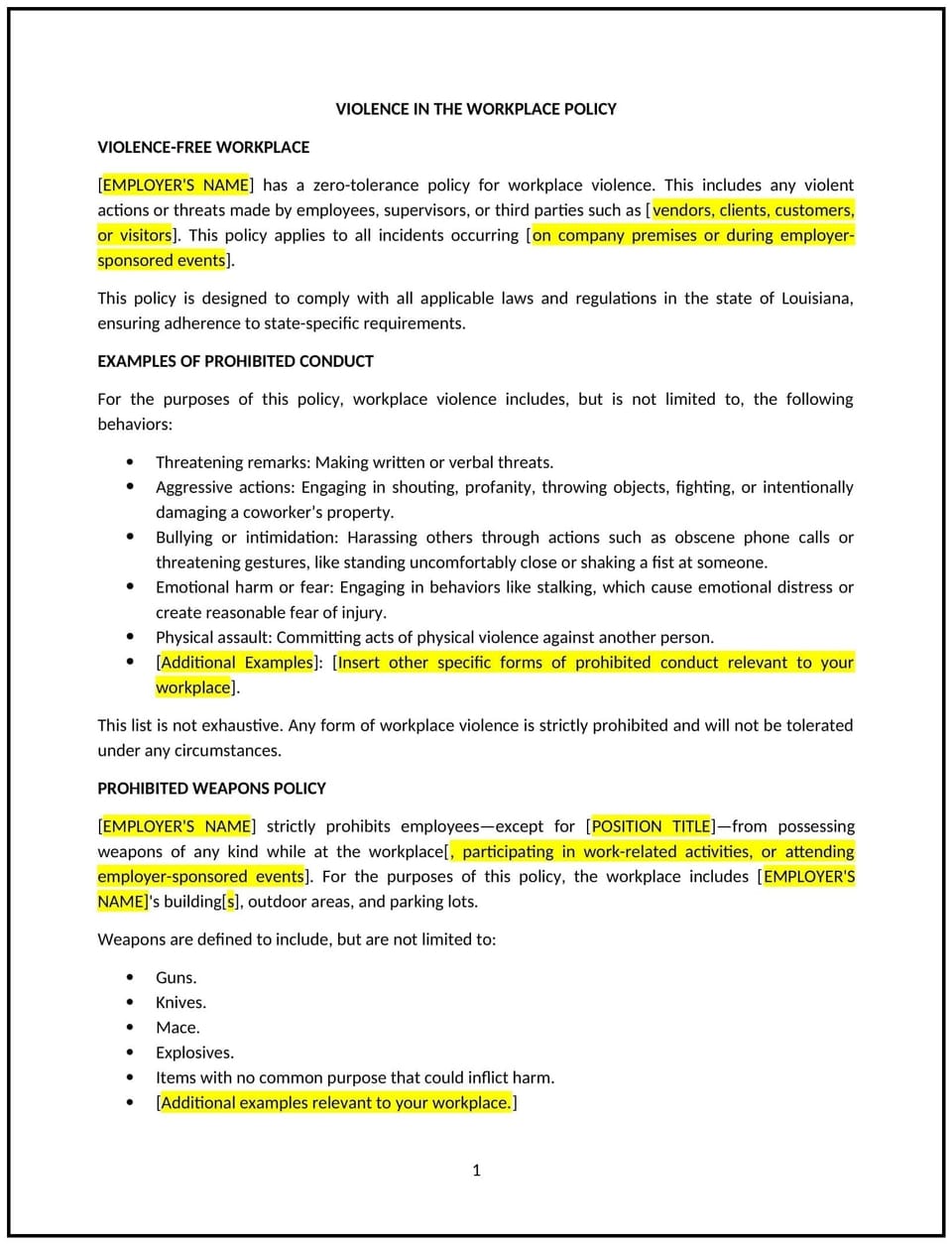Violence in the workplace policy (Louisiana): Free template

Violence in the workplace policy (Louisiana)
This violence in the workplace policy is designed to help Louisiana businesses establish a safe and secure work environment by preventing, addressing, and responding to incidents of workplace violence. It outlines prohibited behaviors, reporting procedures, and steps to ensure the well-being of employees and visitors.
By implementing this policy, businesses can foster a culture of safety, reduce risks, and support affected employees.
How to use this violence in the workplace policy (Louisiana)
- Define workplace violence: Specify behaviors considered violent, including threats, physical harm, harassment, intimidation, and verbal abuse.
- Prohibit specific actions: Clearly list behaviors and actions that are not tolerated, such as carrying weapons or making threats.
- Outline reporting procedures: Provide steps for employees to report incidents of violence, including confidentiality protections.
- Include response measures: Detail how the business will address reported incidents, such as investigations, corrective actions, or law enforcement involvement.
- Communicate prevention strategies: Emphasize proactive measures, such as conflict resolution training or workplace security enhancements.
- Provide support resources: Highlight available resources for employees affected by violence, such as counseling or employee assistance programs (EAPs).
Benefits of using a violence in the workplace policy (Louisiana)
Implementing this policy provides several advantages for Louisiana businesses:
- Promotes safety: Reduces risks of harm to employees, visitors, and the workplace environment.
- Enhances reporting: Encourages employees to report incidents promptly and confidently.
- Supports affected employees: Provides access to resources for recovery and well-being.
- Establishes accountability: Clearly communicates consequences for violent behavior.
- Reflects Louisiana-specific considerations: Adapts to local workplace dynamics and cultural practices.
Tips for using this violence in the workplace policy (Louisiana)
- Train employees: Provide regular training on recognizing and reporting signs of workplace violence.
- Monitor the workplace: Use security measures such as cameras, access controls, and incident reporting systems.
- Encourage reporting: Create a culture where employees feel safe reporting concerns without fear of retaliation.
- Document incidents: Maintain detailed records of reported incidents and follow-up actions to ensure transparency.
- Update regularly: Revise the policy to reflect changes in workplace practices or Louisiana-specific needs.
Q: What is considered workplace violence under this policy?
A: Workplace violence includes physical harm, threats, harassment, intimidation, verbal abuse, or any behavior that jeopardizes safety.
Q: How should employees report incidents of workplace violence?
A: Employees should report incidents to their manager, HR, or a designated safety officer, following the procedures outlined in the policy.
Q: What steps will the business take after an incident is reported?
A: The business will investigate the incident, take corrective actions, and involve law enforcement if necessary, as outlined in the policy.
Q: Are weapons allowed in the workplace?
A: No, carrying weapons in the workplace is prohibited unless specifically authorized for security personnel.
Q: What resources are available to employees affected by workplace violence?
A: Employees can access resources such as counseling services, employee assistance programs (EAPs), or additional workplace support.
Q: How often should this policy be reviewed?
A: The policy should be reviewed annually or when changes occur in workplace practices or Louisiana-specific requirements.
Q: How can businesses prevent workplace violence?
A: Businesses can implement proactive measures, such as conflict resolution training, security enhancements, and fostering a respectful workplace culture.
This article contains general legal information and does not contain legal advice. Cobrief is not a law firm or a substitute for an attorney or law firm. The law is complex and changes often. For legal advice, please ask a lawyer.


